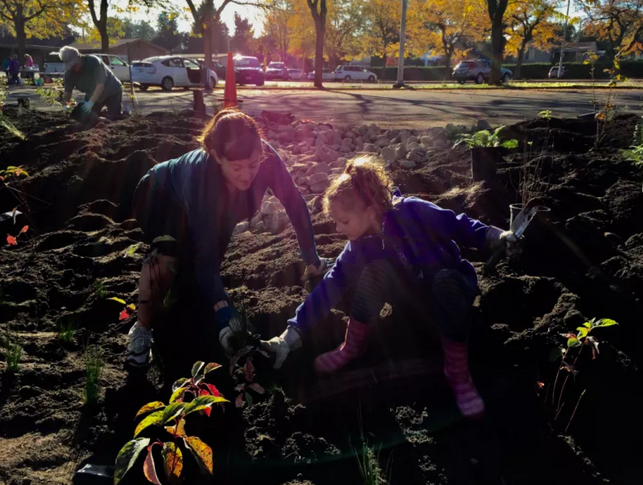A little less asphalt. A little more greenery.
That's the mission of Depave Portland, a volunteer group that is deconstructing parking lots all across the Oregon city, replacing them with water filtration gardens, or playgrounds for children.
Since its founding in 2008, the organization has deconstructed some 75 parking lots across Portland, removing 150,000 square feet of pavement by hand with the help of more than 3,000 volunteers. Its projects have diverted more than 3.5 millions gallons of stormwater runoff from local watersheds.
The movement is spreading; Depave groups modeled on Portland's are now active in Canada, Cincinnati and Tennessee.
Carlos Nuñez, a member of the board, spoke with Streetsblog to explain the motivation and how it all works. (The below has been lightly edited for length and clarity.)
Streetsblog: So how did this idea for an organization get started?
Nuñez: It started in 2008. I don’t think the folks who started it [Arif Khan and Kasandra Griffin] planned on starting an organization.
There were just two people who wanted a garden. But the backyard was all paved. It was a parking lot for the people who lived there before.
They took it out and planted a garden a pomegranate tree. They thought, "Oh, this is really cool, we should do this in other places." They went ahead and did it at a friend's house. Somehow they got an opportunity to do it at an actual parking lot in Portland.
People were asking, "When are we doing the next one?" It kind of got propelled forward.
So how many parking spots has the organization done?
We’ve worked on 71 or 75 parking lots. Mostly they’ve been in Portland but we are trying to reach outside of Portland to different parts of the metro area.
We’re not tearing up the whole parking lot in most places.
What is the goal of most of the depaving projects?
The main reason is to stop the water runoff. Water gets really dirty [when it runs off parking lots] and that usually winds up in a stream. We’re making sure the water gets absorbed by earth. We’re creating a lot of rain gardens.
We're also trying to provide green spaces to communities who don’t have them.
A lot of the work is done at churches, community centers and schools. We rip off the parking lot. We take out all the asphalt. We either make it permeable or we’ll install a rain garden or a play structure with mulch.
Where does your funding come from?
Most of it comes from grants from water, soil and conservation districts. We do have some companies that sponsor us as well.
Do you have a professional staff?
We’re basically run by volunteers. The board consists of about 10 people. We have basically 1.5 staff.
Do you sometimes run into resistance from people who are worried it will be harder to park?
It’s so hard to get rid of parking. Last year, we did some work at a community college. There’s a stream that runs by the community college and it had some serious pollution issues.
Still, it was really hard to convince them to take out even four percent of the parking spaces. We prevented 80 percent of the water runoff from going into the stream. It was so hard hard to convince the students and faculty that that needed to be done.
Do people usually approach you about removing parking spaces or vice versa?
Usually they will approach us. Maybe they're having a problem.
One of our projects was an Ethiopian church that was flooding every time it rained. We took out all the parking spaces that were closest to the foundation and we just installed the rain garden and now no water seeps in.
Do you have to remediate the soil after the pavement is removed or can you just kind of throw seeds on the ground?
We, in most cases, need to bring some contractors to excavate the soil. We do do some soil testing.
We don’t just take out the asphalt and put plants in. There’s definitely a lot of planning that goes on.
Where do you find your volunteers?
Our mailing list is for about 1,500 plus. We always use volunteers for the event.
It’s very important for the volunteers to be able to use their hands and lift that asphalt. That’s a gratifying feeling. And if you put some work into it, you’re a lot more likely to take care of it.
And people really enjoy being part of the change?
I feel like we’ve just gotten so used to looking at these huge spaces are just asphalt and asphalt. Now whenever I got to a new space, I look at how the space is being used and where’s the water going to.
There is space that isn’t being used that could be turned into something more beautiful, that could be turned into something more desirable for the community.






